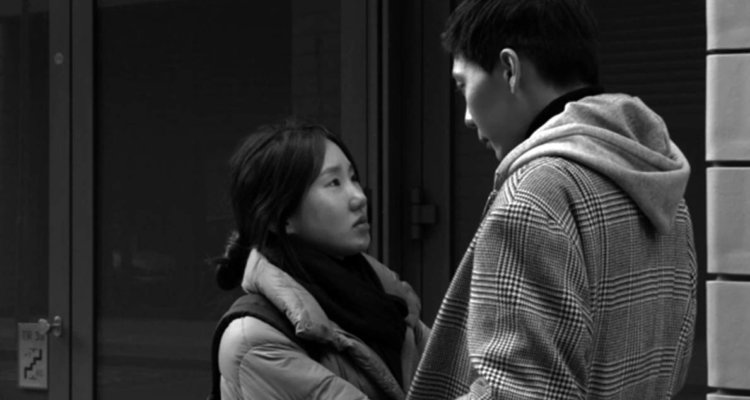South Korean film director Hong Sang-soo is cinema’s reigning poet of strained politeness, awkward confrontation, and space-filling chatter. In film after film—there are two Hongs at this year’s New York Film Festival, which is about average for the prolific South Korean—characters meet in the street or on a beach, in restaurants or hotels, and talk about the weather or the food in front of them, in banal and repetitious dialogue. The vibes are chill, the comedy is dry, and the dead air is heavy with unspoken need and unvoiced aggression, which invariably bursts through in sloppy drunken monologues delivered by actors with suspiciously puffy eyes and flushed faces.
READ MORE: New York Film Festival 2021: The 17 Most Anticipated Films
So it’s quite striking that as his latest, “Introduction” begins, the drama is already sharpened to a point of real urgency. A man sits, facing away from the camera, praying to God for another chance before he raises his head, rises from his chair, and puts on a white lab coat. The source of his anguish is left ambiguous, and so this overture haunts the rest of the film, giving the easygoing and softly sad “Introduction” a gnawing sense of stakes, like any of its deceptively everyday encounters, might be the source of some future regret.
READ MORE: Fall 2021 Movie Preview: 60+ Must-See Films
The praying man in the lab coat (played by Kim Young-ho) is, as it turns out, an acupuncturist, a profession whose comic potential Hong recognizes. In the first of the film’s three chapters, his son Young-ho (Shin Seokho, like many cast members a Hong regular) visits him; we can tell he’s an infrequent visitor since dad’s receptionist can’t stop saying how he’s all grown up.
These early scenes are designed as part one of the film; in Ppart two, set an indeterminate amount of time later, Young-ho’s girlfriend Ju-won (Park Mi-so) is in Germany, where her mother (Seo Young-hwa) is holding her hand through the process of renting a room for her impending studies abroad. You get the sense, in Ju-won’s nervousness around her new landlady (Kim Min-hee), Hong’s regular leading lady, romantic partner and, these days, production manager), and her mother’s comparatively easy rapport, of the tentativeness with which Ju-won is embarking on this new chapter. The film’s title suggests an essential newness and vulnerability to the younger characters and the corresponding worry of the older generation.
READ MORE: NYFF 2021 Full Slate Includes ‘Benedetta’, ‘The Souvenir Part II,’ ‘Memoria’ & More
In part three, again time has passed, and the set of parents and children are again recombined: Young-ho travels to the seaside to visit his mother (Cho Yun-hee), as well as an actor (Ki Joo-bong) who had also visited Young-ho’s dad, for unclear reasons, in part one, and apparently given Young-ho some careless advice about becoming an actor, which Young-ho had taken seriously. (There is always an actor or filmmaker in a Hong film; it’s a way for him to goose his stories with self-deprecating humor at the expense of male vanities he understands very well.) A soju session turns bitter, with mother and mentor questioning Young-ho’s decision to abandon acting; in their frustration with his ambivalence is perhaps some bitterness about their own once-upon-a-time naivete. We also see how Young-ho and Ju-won’s relationship has been resolved, and what happens to the open-endedness of youth once people start making choices.
“In Front of Your Face,” the other Hong Sang-soo film in this year’s New York Film Festival, is the better of the two—in fact, it’s his best in years, in fact. There, he follows a single woman with a secret through a single day’s appointments, and a reckoning with her past and future; it’s a sustained drama with a long-running time for a Hong film focused on a single character—85 minutes!—but with real focus, and with images and narrative compressed into moments of grace. “Introduction,” at 66 minutes, is more in the vein of Hong’s other recent films: it has the feel of a sketchbook, with the motivation of each episode discovered during the writing, as Hong slowly accumulates coincidences and parallels. His preoccupations are visual as well as thematic—offseason hotels and cold oceans, a digital black-and-white in which what’s outside the windows is often just gray glare. Hong these days acts as his own D.P., editor, and composer, as well as being a writer-director, and there’s a stark elegance to “Introduction,” a sense of an artist honing his craft down to its simplest, most telling gestures. [B]
Follow along for all our coverage of the 2021 New York Film Festival.

